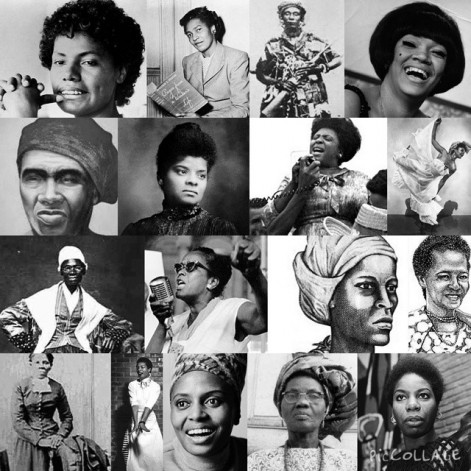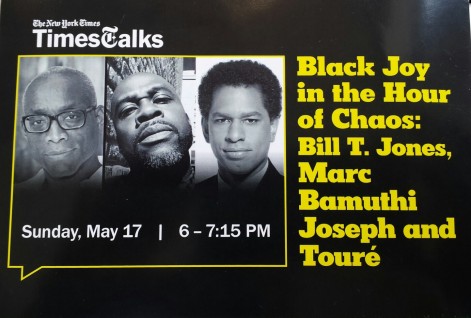Black Power Without Black Women Is Weak
“The most disrespected person in America is the Black woman, the most unprotected person in America is the Black woman. The most neglected person in America is the Black woman.” – Malcolm X
When most people think about Malcolm X they immediately think of Black manhood leading to associations of Black power tied exclusively to the work of Black men. This is most likely a case of people not knowing that our own Black shining prince was quite vocal about his belief that the empowerment of Black folk is contingent on the freedom and empowerment of Black women. So today on what would’ve been Malcolm X’s 90th birthday, I think it’s quite fitting to talk about Black women and how much our lives and our joy matters to the overall success and strength of the #BlackLivesMatter movement.
To be quite candid, Malcolm X’s birthday isn’t what totally inspired this post. It was last Sunday’s “Harlem Eatup” panel at MIST in Harlem presented by the NY Times to discuss Black joy, power and pain that’s got my Victoria’s Secrets in a gnarly twist. The convo, wonderfully titled, “Black Joy in the Hour of Chaos,” featured award-winning choreographer and director Bill T. Jones, artist Marc Bamuthi Joseph and MSNBC correspondent Touré. As soon as they all sat down on stage, it was is if someone threw cold water in my face. I realized we were about to talk about the condition of Black people without the input of Black women …yet again.
Now the talk was all that and a bag of Hint of Lime Tostitos. They talked about dance, soul, protests, and anger with Mr. Bill T. sharing that soulfulness was his “hallelujah spot” and Marc declaring, “I do not trust art that doesn’t bleed or sweat or cry.” Names such as Sean Bell, Malcolm X, Alvin Ailey, and Barack Obama were bandied about to illuminate the idea of “being on your game” while addressing race. Marc broke out into the Running Man, Touré laughed and kept both men, as well as the audience, engaged while Mr. Bill T. had us at, “Hello” and slayed us at, “Humanity is a bitch.” He was all no chill and we were better because of it. There was only one problem: Where were the women? How can you talk dance and not mention Judith Jamison or have Camille Brown on stage in full extension? How can we mention soul and not shout out Aretha Franklin or Mary J. Blige? If Black joy is Mr. Ailey and Malcolm then surely it is also Nina Simone and Shirley Chisolm. If Black pain is Sean Bell and Freddie Gray it most certainly is also Rekia Boyd and Natasha McKenna! And we all know the most radical talk about race to come out of the White House came from First Lady Michelle Obama at her recent keynote at Tuskegee University’s commencement. It’s so easy to make Black struggle and it’s essential counterpart, Black joy, a platform by which we only exalt Black manhood because in doing so it keeps us from having to tell the uncomfortable and challenging story of feminism and sexism in our communities and the relevance of motherhood and sisterhood in our own lives. These seldom held discussions make it easier to forget our contributions and experiences and leave Black women off stage in the audience applauding instead of on the microphone telling it like it is.
Every time I find myself in these gendered circles I get pissed, almost immediately, because I know we know better in 2015. For Oshun’s sake the #BlackLivesMatter movement was started by THREE Black women. We are talking about having a Black woman on the $20 bill and Cookie and Olivia Pope reign supreme in prime time ratings. At one point in the conversation Mr. Bill T. even spoke about having to acknowledge his privilege as a gay Black man of being in a “d*ck club.” There is just no excuse. Malcolm knew back in 1962 so I kind of expect folk to know now. And not only is it important that we make mention of these women, but it is also imperative that Black women are at the table participating in these conversations as well.
At the end of the discussion during Q&A I stood up and said that we have to do better and urged the panelists that anytime they are on a panel about race and there are no Black women to either recommend women or not participate. The room erupted into applause and so I feel it important to say it again, here. Do not promote or participate in panels about race, social justice, Black Pain, Black Joy, Black Life, et. al that do not include the voices of Black women. There are way too many of us on the front lines calling shots and taking shots to not be in the number.
So on this day, which is not only El Hajj Malik El Shabazz’s birthday, but also the birthdays of Grace Jones and Lorraine Hansberry who showed us that Black, berry Black, is sexy and showed us what being young, gifted, Black and a woman in America was like, respectively, I tip my hat and raise my glass and say, lest we forget, that the experiences of Black women matter today and always.








Good morning, Miss thehotness, Yes you are so correct there is no reason to have a debate, conference, etc…without our Black Woman present and heard. Where would we be without them our better half and most importantly their unselfish wisdom and strength.